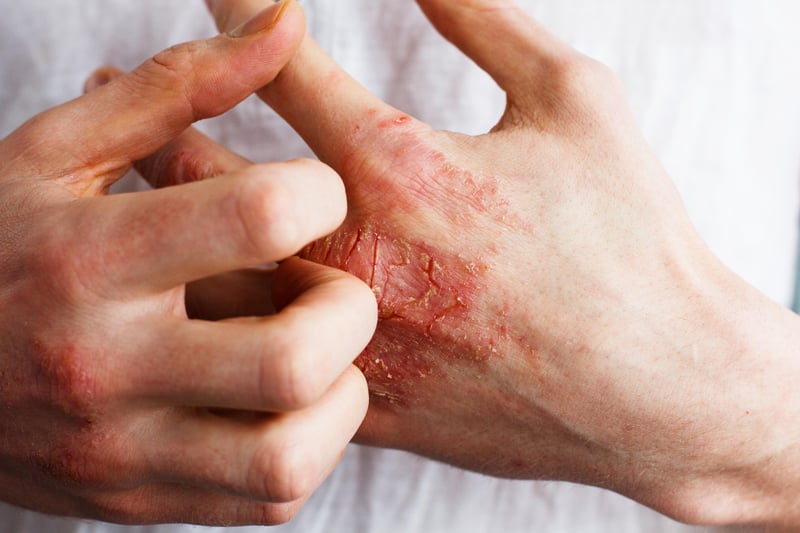Get Healthy!

- Cara Murez
- Posted July 25, 2023
Vitamin D Might Ease the Agony of Psoriasis
People who have psoriasis may want to get their vitamin D levels checked.
New research suggests that blood levels of the so-called "sunshine vitamin" may affect the severity of their condition. In psoriasis, skin cells build up and form dry, itchy, sometimes painful patches.
While synthetic vitamin D creams are an emerging therapy, the study suggests that a diet rich in vitamin D or oral supplements could also ease psoriasis symptoms, said Rachel Lim, a study author and MD candidate at the Warren Alpert Medical School of Brown University.
If the role of vitamin D can be proved after further study, "it may present a very accessible and safe addition to the treatment regimen of the millions of Americans living with psoriasis,"Lim said.
About 8 million Americans have psoriasis.
For the study, researchers analyzed 491 cases in a U.S. national health and nutrition survey, including 162 from 2003 to 2006 and 329 from 2011 to 2014.
Their analysis found that lower vitamin D levels and deficiency were significantly associated with more severe psoriasis.
Patients with the highest average vitamin D levels had the least amount of psoriasis-affected skin. Those who had the most affected area had the lowest average vitamin D levels.
The amount of vitamin D a person would need to consume isn't clear.
"While we can't talk about the optimal vitamin D intake, there are current recommendations regarding safe amounts of vitamin D supplementation to avoid toxicity,"Lim said. "People may want to speak to their doctors about starting vitamin D supplementation safely."
There could also be other contributors to a person's psoriasis. Skin pigment inhibits vitamin D synthesis, Lim said. And psoriasis affects many people with darker skin tones.
"Coupled with socioeconomic factors and barriers to proper care, we could be misattributing the increasing psoriasis severity we found with lower vitamin D levels solely to lower vitamin D levels, instead of to more complex societal constructs obstructing care,"Lim said.
The study is a reminder that lower vitamin D is associated with worse psoriasis and that supplementation might help, said Dr. Deirdre Hooper, a dermatologist with Audubon Dermatology in New Orleans. Hooper was not involved in the study.
"Are we going to take away from this that every person with psoriasis should supplement with vitamin D regardless of their blood levels?" she said. "I think this is an unanswered question, but I think that what I will probably do based on the study is suggest that my psoriasis patients supplement with vitamin D."
While it appears vitamin D will improve a person's psoriasis, it can also help with some associated health issues, including diabetes and high blood pressure, Hooper said.
Sunshine is a major source of vitamin, but it's not safe to get all the vitamin D you need from the sun, because its UV rays can cause skin cancer.
And, Hooper said, although a person might be able to get enough of the nutrient through diet, "the best way to consume vitamin D is to take a supplement."
Some foods that contain vitamin D are fatty fish, like salmon and mackerel, and egg yolks. Some fortified foods like cereal, milk and orange juice also contain the nutrient.
But, be aware that food sources can be unreliable because how much vitamin D a particular food contains may vary.
If a person does have psoriasis and hasn't received medical care, Hooper recommends seeing a dermatologist.
Psoriasis can affect a person's daily life and potentially interfere with sleep.
A variety of treatments are available, including creams, light therapy and both oral and injectable drugs.
"It's evolving constantly, which is great because it's a common disease and it's super frustrating and it's associated with real systemic problems,"Hooper said.
Lim was scheduled to present her findings on Tuesday at a meeting of the American Society for Nutrition, in Boston. Findings presented at medical meetings are considered preliminary until published in a peer-reviewed journal.
More information
The National Psoriasis Foundation has more on psoriasis.
SOURCES: Rachel Lim, MD candidate, Warren Alpert Medical School of Brown University, Providence, R.I.; Deirdre Hooper, MD, dermatologist, Audubon Dermatology, New Orleans; presentation, American Society for Nutrition meeting, Boston, July 25, 2023





